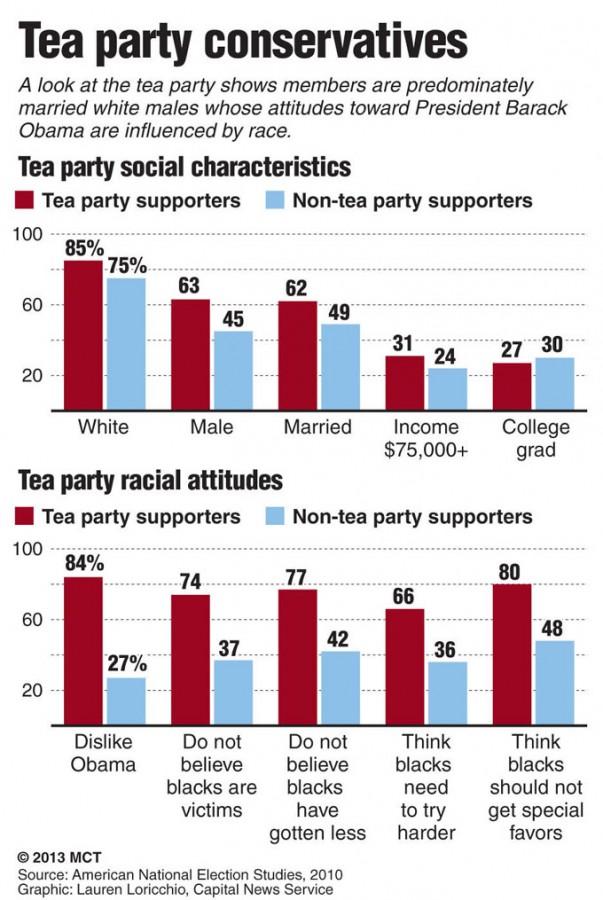Combining Capitalism and Socialism
Charts showing tea party social characteristics and racial attitudes; a look at the tea party shows members are predominately married white males whose attitudes toward President Barack Obama are influenced by race.
February 10, 2016
Very recently, I was watching MSNBC, trying to catch up on the recent political news, when I found out that Bernie Sanders is ahead of Hillary Clinton in New Hampshire, and leading overall in the general election.
As an avid Bernie Sanders supporter, I was overjoyed at the news, however, my uncle, a stubbornly patriotic conservative and former US Army Special Forces lieutenant, was not so excited.
“He’s going to destroy America,” he said. I replied by questioning his thinking to which he stated in a pseudo-intelligent fashion, “He’s a socialist. Same thing as the communists. I didn’t take a bullet in Desert Storm so that we could have a Marxist in office. All hail comrade secretary Sanders!”
This got me wondering. After my fight with my uncle, I began to ask myself, why Americans fight over socialism and capitalism. Taken to the extremes, they become failures, but when reaching a balance, the two systems provide a booming economy, a strong middle class, and a large social safety net. So why do we choose sides?
Four decades of cultural and economic struggle between East and West that shaped our world today. But how, exactly, does Socialism benefit capitalism? How does social programs benefit the market?
Socialism, unchecked, becomes a Soviet Style dictatorship where the majority live in poverty while a few government officials live like kings. However, capitalism, unchecked, becomes a similar corrupt state where wealthy robber barons rule over a peasant majority, similar to communism.
Social programs like universal healthcare benefit businesses, which benefits capitalism. For example, a company that makes cars in America need to spend billions on healthcare for their workers. If they moved production of their cars to a different country, they would not have to spend money on health care for their employees. Thus, the cost of the companies cars go down because they do not need to make up the funds lost by providing healthcare.
The Huffington Post, illustrates my views perfectly when stating that, “in Japan, Toyota enjoys the economic benefits of universal health care. Because of universal health care, Toyota’s production costs are $1,400 lower per vehicle than the cost for American manufacturers.”
Since Toyota does not have to provide healthcare for their employees, the cost of the cars go down. Since the cars are cheaper, they sell more resulting in more profits for the company.
“That translates directly into competitive advantage, as Toyota makes $2,400 more per car than its U.S. counterparts. Back in the United States, GM has said that the cost of providing health care for its workers adds between $1,500 and $2,000 to the price tag of every vehicle it sells.”
The minimum wage law, the law that sets a benchmark for how much workers should be paid, is a socialist philosophy, and it also benefits capitalism. A minimum wage law leaves the worker with a higher salary, and thus, more money to spend, keeping the market alive by giving the consumer more options.
The US department of labor gives evidence for this in a survey from business owners. The survey reports that small business owners say an increase “would immediately put more money in the pocket of low-wage workers who will then spend the money on things like housing, food, and gas.” Thus “this boost in demand for goods and services will help stimulate the economy and help create opportunities.”
These social programs, as well as other programs like the highway system and social security, all keep the markets circulating. They are the key to a strong society.
It’s time to stop bickering and start accepting the fact: socialism needs capitalism, and capitalism needs socialism.









Lisa • Jul 17, 2021 at 3:28 pm
Great article! And so true. Sadly it seems the older people get, the more stubborn they get about taking sides. Worse now with the internet and social media! (Well not me, I’m 41.)